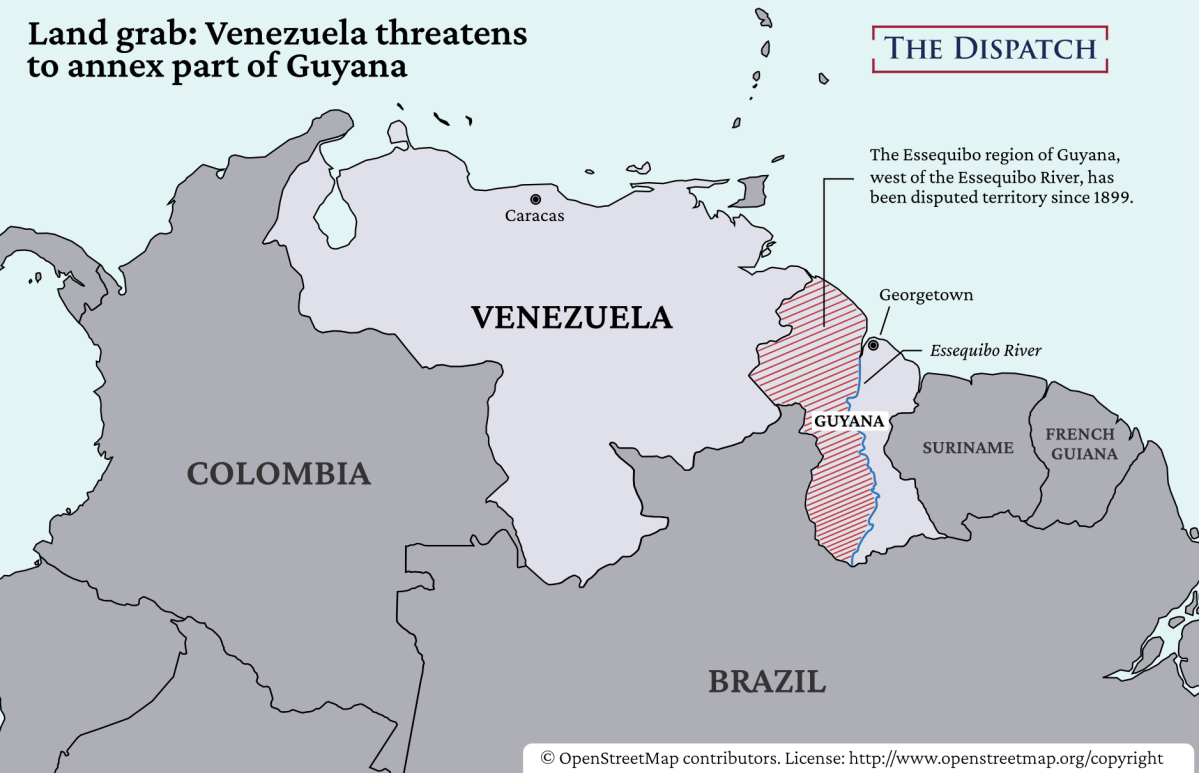Happy Wednesday! Chevy may have already made the best holiday ad this year. But don’t make the mistake we totally made and watch it with raw onions around.
Quick Hits: Today’s Top Stories
- Ukrainian President Volodymyr Zelensky visited Congress on Tuesday, meeting with lawmakers to advocate for additional U.S. aid to his war-torn country. House Speaker Mike Johnson told reporters he had a “good meeting” with Zelensky, but reiterated his objection to passing additional aid without also addressing border security. Zelensky capped the first day of his Washington visit with a joint press conference with President Joe Biden at the White House yesterday evening, where both leaders pushed Congress for additional military aid. The Biden administration declassified intelligence assessments yesterday that suggest Russia’s operations over the last few months have been structured to erode international support for Ukraine by pushing the conflict towards a stalemate, even at the expense of huge Russian losses. The reports were made public in an effort to strengthen the argument for continued assistance.
- Biden criticized the Israel Defense Force’s (IDF) bombing of Gaza in a speech at a fundraiser in Washington on Tuesday, describing the campaign as “indiscriminate” and warning that Israel will lose international support if it doesn’t change course. “Israel’s security can rest on the United States, but right now it has more than the United States,” Biden said. “It has the European Union, it has Europe, it has most of the world. ... But they’re starting to lose that support by indiscriminate bombing that takes place.” National Security Adviser Jake Sullivan suggested yesterday that Israel should shift its tactics away from large-scale bombing and toward more targeted operations, and will visit Israel later this week to discuss the timetable for Israel’s military offensive in the enclave. “It doesn’t have to be that you go from [bombing] to literally nothing in terms of putting pressure on going after Hamas targets, Hamas leadership, or continuing to have tools in your toolbox to try to secure the release of hostages,” he said. “It just means that you’ve moved to a different phase from the kind of high-intensity operations that we see today.”
- Yemen’s Houthi rebels struck a Norwegian tanker with an anti-ship cruise missile on Monday while the vessel traversed the Bab-el-Mandeb Strait, which connects the Red Sea and the Gulf of Aden. No one was injured and the crew was able to put out the fire from the missile strike; the ship is now sailing to a safe port. A French military frigate operating in the area also shot down a drone from Yemen threatening the tanker, which was headed to Italy but had been selected to pick up cargo from an Israeli port next month. The Iranian-backed Houthis have claimed responsibility for a series of attacks targeting commercial vessels in the Red Sea since the start of the Israel-Hamas war on October 7.
- The Consumer Price Index rose 0.1 percent month-over-month and 3.1 percent annually in November, the Bureau of Labor Statistics reported Tuesday, compared to a flat monthly rate and 3.2 percent annually in October. November’s inflation was slightly above economists’ expectations, and core inflation—a metric that strips out volatile food and energy prices—increased 0.3 month-over-month and 4 percent annually, up from the previous month. Nonetheless, the moderate increase is still expected to keep the Federal Reserve on track to hold rates steady at its meeting later today.
- New Hampshire Gov. Chris Sununu endorsed Nikki Haley for president Tuesday evening at a Haley campaign event in Manchester, New Hampshire. The popular Republican governor argued Haley is “the candidate with the momentum to win” and could move the party beyond Trump. “This is an opportunity for New Hampshire to lead this country,” he said. “For New Hampshire to say we’re not looking in the rearview mirror anymore.” Former President Donald Trump has a 27-point lead over Haley in the Granite State, according to the latest RealClearPolitics polling average.
Trouble in Essequibo

There’s nothing like a little oil (or a lot of oil) to reignite a centuries-old feud—just ask Venezuelan President Nicolás Maduro as he attempts to reassert claim over Essequibo, a territory that comprises some two-thirds of neighboring Guyana’s total area and, since 2019, the site of significant and growing offshore drilling.
As Venezuelan and Guyanese troops assemble on their respective sides of the border, the brewing territorial crisis hasn’t yet turned into an armed conflict between Venezuela and its English-speaking neighbor. But Maduro’s saber-rattling over Essequibo, which seems to be driven both by political and economic considerations, has officials in Georgetown, Guyana’s capital—as well as in Washington and in capitals around the region—on edge.
Guyana, a former British colony on the northern coast of South America with a population of fewer than 1 million people, and Venezuela have never been the best of friends. At least some of that rivalry has to do with Caracas’ claim over Essequibo—a sparsely populated, oil- and mineral-rich area west of the Essequibo River. In 1899, the border was supposedly settled in an international arbitration process: Essequibo belonged to Guyana, then known as the colony of British Guiana. Venezuela maintained opposition to that decision, and when Guyana gained independence from Britain peacefully in 1966, the question came up again. An agreement negotiated in Geneva functionally froze the conflict, which gave no particular credence to either side’s claim and demanded neither party do anything to upset the status quo pending a peacefully negotiated resolution.

The territorial dispute was largely dormant during the reign of Venezuelan dictator and Maduro-mentor Hugo Chávez, who never renounced his country’s claim on the region but did soften his rhetoric on the central foreign policy issue to maintain ...
As a non-paying reader, you are receiving a truncated version of The Morning Dispatch. Our full 1,604-word story on rising tensions between Venezuela and Guyana is available in the members-only version of TMD.
Worth Your Time
- Much digital ink has been spilled on social ills plaguing today’s teens, from the effects of smartphones and social media on mental health to the decline in time teens spend socializing in the analog world. Conor Friedersdorf, writing for The Atlantic, offers a glimpse of teen social life before the internet age, curating stories from older readers on how they grew up. Our favorite is “Donna from New Jersey,” who was a teenager in the 1960s. “My neighborhood had a lot of kids my age, and then there were the kids we met in school,” she wrote. “In the summer we would hang out at Fifth Ward Park or Warinanco Park; winter found us ice-skating on the frozen lake at Warinanco with a wooden boathouse with a pot-bellied stove we made hot chocolate on, or walking to the ice rink. Sometimes we all got together and sang a cappella or lip-synced to popular music. The ‘60s were a turbulent time in history. Vietnam images came nightly on the news. However, there was no 24-hour news, and newsmen reported the facts. No internet, cellphones, or video games. We were aware of what was going on, especially when friends/relatives got drafted, but it was not uppermost in our minds. Sounds idyllic now; conversations with my grandchildren made me realize that the ‘60s were not so bad to grow up in.”
Presented Without Comment
Axios: Jack Smith to Use Trump’s Phone Data at Trial
Also Presented Without Comment
Associated Press: Far-Right Lawmaker Extinguishes Hanukkah Candles in Polish Parliament
Toeing the Company Line
- The war in Gaza, the January 6 raw footage dump, Essequibo, and the South China Sea. Mike was joined by Adaam, guest opinion writer John Aziz, Grayson, James, and Alex to discuss all that and more on last night’s Dispatch Live (🔒). Members who missed the conversation can catch a rerun—either video or audio-only—by clicking here.
- In the newsletters: Nick argued 🔒 that the trainwreck of a hearing with the university presidents on antisemitism represents a huge win for populism.
- On the site: John unpacks a controversial Texas abortion case, Michal Leibowitz reflects on celebrating Hanukkah in America in the aftermath of October 7, Keith Whittington explains the importance of consistently protecting free speech on college campuses, and Jonah argues populism is to blame for nonsense like “dictator-for-a-day” comments.









Please note that we at The Dispatch hold ourselves, our work, and our commenters to a higher standard than other places on the internet. We welcome comments that foster genuine debate or discussion—including comments critical of us or our work—but responses that include ad hominem attacks on fellow Dispatch members or are intended to stoke fear and anger may be moderated.
With your membership, you only have the ability to comment on The Morning Dispatch articles. Consider upgrading to join the conversation everywhere.